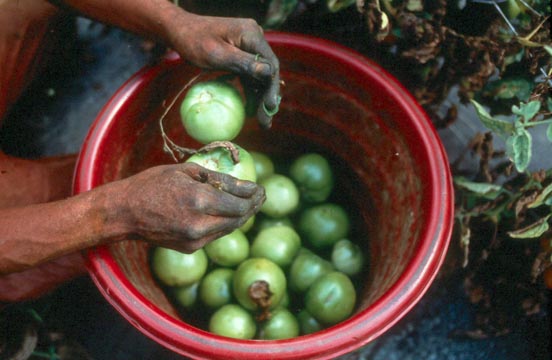Global food security priorities for next four years
In early January a number of faith communities and allied organizations that work to support individuals and societies striving to meet basic human needs wrote to President Obama to congratulate him on his election to a second term, and to raise a number of concerns as his administration continues to develop policies and programs that address global hunger and rural poverty. The following edited version of that letter outlines the course of action needed to address the right to food and to protect our planet from further ecological destruction.
Published in the January-February 2013 NewsNotes
In early January a number of faith communities and allied organizations that work to support individuals and societies striving to meet basic human needs wrote to President Obama to congratulate him on his election to a second term, and to raise a number of concerns as his administration continues to develop policies and programs that address global hunger and rural poverty. The following edited version of that letter outlines the course of action needed to address the right to food and to protect our planet from further ecological destruction.
Food price volatility: While changing weather conditions and poor harvests play a significant role, it is hard to deny the impact that a massive expansion of investment in under-regulated commodities derivatives through commodity index funds by non-traditional investors has had in recent price hikes in global commodity markets. Commodity price volatility in U.S. markets contributes to increased prices and hunger in developing countries, many of which are dependent on food imports and rely on U.S. markets to set purchase prices. The United States took some positive steps to increase the transparency of those markets and to limit excessive speculation under the Dodd-Frank Wall Street Reform and Consumer Protection Act. We encourage the United States to fully implement those reforms and to work with other G20 countries, particularly those in Europe, to advance similar efforts.
At the same time, we encourage the United States to support global solutions that will protect the poorest communities from food supply shocks. In light of the continued volatility of food prices and supplies, we encourage the United States to explore and foster national and regional food commodity reserves so that developing countries can better cope with price shocks or crop failures. We ask you to explore the establishment of buffer stocks of key commodities that would be triggered when stock-to-use ratios fall to levels that put unsustainable pressures on food prices. Without protected food reserves, the market puts the entire burden of price shocks on vulnerable populations…
Agroecology: We are concerned that the U.S. government has not fully assessed the economic, social and political consequences of its current emphasis on biotech solutions to global hunger, especially the ability of poor farmers to reap benefits from research that is ultimately patented and sold. Instead, we encourage the U.S. to consider the documented achievements of agroecological approaches – to work with farmers themselves to invest in understanding site-specific practices for soil preservation, crop rotation, conservation, forestry and water systems that enhance local food production by smallholder farmers, while protecting the environment, reducing poverty and promoting the right to food. Considerable research by the UN Environmental Program, the UN Conference on Trade and Development, the International Assessment of Agricultural Knowledge, Science and Technology for Development and the UN Special Rapporteur on the Right to Food, among others, concludes that these approaches are more successful in responding to development needs and to climate change threats…
Public-Private Partnerships and private investment: It is critically important that the both the public and private sectors contribute to advancing food security. It is equally important that the recent U.S. initiatives to increase public-private partnerships and private investment ensure that these efforts are characterized by transparency and accountability. In addition public support to agricultural development must continue to be scaled up rather than diminished. Public-private partnerships and private investments must be held to the same rigorous standards as other food security programs and reflect a “right to food” approach, addressing not only access to food, but also availability to diverse communities, nutritional adequacy and sustainability. Participating firms should affirm their commitment to the full spectrum of human rights and establish due-diligence processes to be aware of, prevent and address violations. Public-private partnerships and private investment should demonstrate specific benefits for truly smallholder farmers. Such benefits should be identified in advance and endorsed by community organizations and producer associations during consultation processes and should include locally appropriate measures and tailored programs to ensure the empowerment and participation of women farmers. In addition, government investment in public-private partnerships should not serve to unduly consolidate or expand a firm’s share of the market in a given country.
Trade: Rapid trade liberalization has often had a negative impact on the livelihoods of local farmers, rural development and national food security. Unexpected surges in imports of low-cost foods (whether because of dumping or as a result of poorly timed food assistance programs) can seriously disadvantage small-holder farmers in developing countries, and contribute to food insecurity. We urge you to support trade policies that promote strong and stable local markets to increase the availability of and affordable access to healthy and culturally appropriate foods and to increase smallholder farmers’ incomes. In addition, we call on you to publish the negotiating text for the Trans Pacific Partnership to enable an informed public debate on its provisions, especially the chapters on investment, intellectual property rights and tariff liberalization that have the potential to undermine food security…

